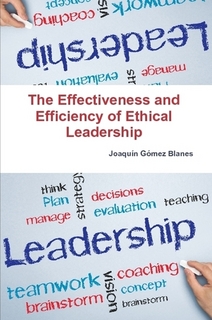
The Effectiveness and Efficiency of Ethical Leadership
Becoming a leader requires personal habits of two types. The first set of habits refer to the forging of personal character, and the second have to do with professional competency. The latter might guarantee immediate success, but the former habits have to do with long-lasting leadership and form the basis for the deeper growth of one’s various competencies.
This is a concise presentation of personal leadership and how to build it within oneself, and furthermore upon an ethical foundation. It is written precisely for those who are interested in developing personal leadership but have little time to read long expositions on the subject.
The last chapter is a case study that helps the reader assess how well he or she has learned the themes presented.
Some years ago Stephen R. Covey’s book, The Seven Habits of Highly Effective People, happened to fall into my hands. I must say it stirred up great enthusiasm. It just so happened that in the same moment I managed to see a film that I had heard so much about and yet never had taken time to see– Twelve Angry Men (1957). I don’t really know why, but it spontaneously came to me to observe the various scenes of the film from the perspective of Covey’s book, which I had just finished reading.
And so the idea was born to structure a course and add more material. I began teaching a course in the School of Church Communications at the Pontifical University of the Holy Cross, and then later to sereval groups of entrepreneurs and business managers, arranging it accordingly in ways that would satisty their respective needs. Later I began to give this course to groups of university students and different conference and film clubs.
I have always wanted this concise text, something useful to those interested in the argument but who have little free time. So, it had to be easy to read and capable of providing some points of deeper reflection. Behold the result!

Leadership course in Johannesburg
Five seasons of two hours each to explain personal leadership. Becoming a leader requires personal habits of two types. The first set of habits refer to the forging of personal character, and the second have to do with professional competency. The latter might...
Listen to communicate and motivate
For Peter Drucker (The Practice of Management), it is the director who fixes the objectives that need to be reached (Covey’s 2nd and 4th habits), and organises the necessary activities (Covey’s 3rd habit). A director then motivates and communicates. He or she...
Time Management in Covey & Drucker
Time management is of great importance for the work of direction. Let us see how Stephen R. Covey and Peter Drucker deal with this issue. Covey divides tasks to be accomplished into: urgent, not urgent and important, or not important. He then analyzes all the possible...
Habit and Action
It is not just the result that counts, even though this is indeed very important. Actually, insofar as I am interested in obtaining the best result, I consider the initial upsets as simply partial, as further occasions to in a real way lead me to the finish line. In...
Consistency and Integrity
Imagine that one day on your way to work a person walks up to you. This person is smiling and asks you to answer a simple question: “What do you look for in a leader? What are the characteristics that, in your opinion, must never be missing in a person who directs an...
The Leader Servant
Many authors,[1] speak of the leader-servant who judges his or her success not only according to the achievement of the result, but also on the basis of the effects of that result in those who materially collaborated to that end. That is, action produces two types of...

